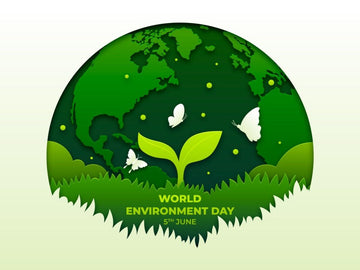Beat Plastic Pollution: Taking Action on World Environment Day
World Environment Day is an annual event that takes place on June 5th. It is a day when people across the globe come together to raise awareness and take action on the most pressing environmental challenges facing our planet. This year, the theme for World Environment Day is "Beat Plastic Pollution," which is a call to action to reduce the amount of plastic waste we generate and prevent it from ending up in our oceans, rivers, and other natural habitats. Plastic pollution has become a significant environmental problem, posing a threat to our marine life, ecosystems, and human health. In this blog post, we will explore the impact of plastic pollution on our planet and discuss some simple and effective ways to reduce our plastic footprint and help protect our environment. Let's join hands to beat plastic pollution on this World Environment Day!
1. Introduction to World Environment Day and Plastic Pollution
World Environment Day is celebrated every year on June 5th and is a day dedicated to raising awareness about environmental issues and encouraging global action to protect our planet. This year's theme, "Beat Plastic Pollution," is a call to action to combat one of the most pressing environmental issues of our time.
Plastic pollution is a global problem that affects every corner of the planet. It is estimated that by 2050, there will be more plastic in the ocean than fish. Plastic waste not only harms marine life, but it also affects human health and the economy. It contaminates our food and water sources and costs billions of dollars in cleanup and remediation efforts.
The good news is that we can all take action to reduce plastic pollution. From using reusable bags and water bottles to recycling and properly disposing of plastic waste, there are many simple steps we can take to make a difference. World Environment Day is an opportunity to come together as a global community and take action to protect our planet for future generations.
2. Understanding the impact of plastic pollution on our planet
Plastic pollution is one of the biggest environmental challenges that our planet is facing today. It is a rapidly growing problem that is affecting our oceans, marine life, and even our own health. Plastic does not biodegrade, meaning that it stays in our environment for hundreds of years. Instead, it breaks down into smaller and smaller pieces known as microplastics, which can be ingested by marine animals and eventually end up in our food chain.
According to a report by the World Economic Forum, by 2050 there will be more plastic in the ocean than fish if we don't take action. This is a terrifying reality and one that should make us all take notice. Plastic pollution is not just an environmental issue, it's a social and economic one too. It impacts tourism, fisheries, and even our own health.
The use of single-use plastics, such as straws, bags, and water bottles, are some of the biggest contributors to plastic pollution. It's estimated that around 8 million tonnes of plastic waste ends up in the ocean every year, which is equivalent to dumping a garbage truck full of plastic into the ocean every minute. This is not sustainable and we must take action to reduce our plastic consumption and increase our recycling efforts. Understanding the impact of plastic pollution is the first step in taking action to address this critical issue.
3. Plastic pollution statistics and facts
The statistics and facts surrounding plastic pollution are staggering. According to the United Nations, every year, at least 8 million tons of plastics leak into the ocean - which is equivalent to dumping the contents of one garbage truck into the ocean every minute! This plastic pollution affects marine life and ecosystems, with up to 100,000 marine animals dying each year from plastic entanglement and ingestion.
Furthermore, plastic pollution is not just limited to the oceans. It also affects our land and air. It is estimated that around 79% of plastic waste ever produced is still in the environment, with landfills and illegal dumping sites being the primary contributors. Burning plastic waste also releases toxic chemicals into the air, which can cause respiratory problems and other health issues.
It's clear that plastic pollution is a global crisis that requires immediate action. By reducing our use of single-use plastics, properly disposing of plastics, recycling, and supporting initiatives that tackle plastic pollution, we can all play a part in making a difference. On this World Environment Day, let's pledge to take action and beat plastic pollution for a better future.
4. Ten simple ways to reduce plastic pollution
Plastic pollution is a huge problem that we face in our current world. It is not too late to make simple changes in our daily lives that can make a significant impact on reducing plastic pollution. Here are ten easy ways to reduce plastic pollution:
1. Bring your own reusable bags when shopping, instead of using plastic bags.
2. Use a refillable water bottle or thermos instead of single-use plastic bottles or cups.
3. Say no to plastic straws and bring your own reusable straw if needed.
4. Use reusable containers for food storage instead of plastic bags or wrap.
5. Choose products that have minimal or no plastic packaging.
6. Avoid products that contain microbeads, which are tiny plastic particles often found in personal care products.
7. Recycle plastic items properly by checking with your local recycling facilities to ensure you are recycling correctly.
8. Participate in beach or river cleanups to reduce plastic waste in our oceans and waterways.
9. Purchase products made from recycled or biodegradable materials.
10. Spread awareness among your family, friends, and colleagues about the importance of reducing plastic pollution.
By implementing these simple steps, we can all do our part in reducing plastic pollution and protecting our environment.
5. How to recycle plastic the right way
Recycling plastic is a great way to reduce the amount of plastic waste that ends up in landfills and oceans. However, it's important to recycle plastic the right way to ensure that it can actually be recycled and turned into new products. Here are a few tips on how to recycle plastic the right way:
1. Check the recycling symbol: Not all plastics are recyclable, so it's important to check the recycling symbol on the product. Look for the numbers 1-7 inside the triangle to determine if it can be recycled in your area.
2. Clean and dry the plastic: Before recycling, make sure to clean and dry the plastic to remove any food or liquid residue. This will ensure that it can be processed correctly.
3. Remove lids and labels: Lids and labels can cause issues during the recycling process, so make sure to remove them before recycling.
4. Don't bag your recycling: Putting your recycling in a bag can cause issues during the sorting process. Instead, put your recycling directly into your recycling bin.
5. Recycle at home or in your community: Many communities have recycling programs, so make sure to take advantage of them. If your community doesn't have a recycling program, consider starting one or finding a local recycling center.
By following these simple tips, you can help reduce plastic waste and ensure that plastic is recycled properly. Remember, small actions can make a big impact when it comes to protecting our environment.
6. The importance of bioplastics and alternatives to single-use plastics
Single-use plastics have become a major environmental issue, causing damage to our planet and harming wildlife. In response to this issue, many companies have started to explore alternatives to traditional plastics. One of the most promising alternatives is bioplastics.
Bioplastics are made from renewable resources, such as corn starch or sugarcane. They are biodegradable and compostable, which means they break down much faster than traditional plastics and don't release harmful toxins into the environment.
While bioplastics are a more sustainable alternative to traditional plastics, they are not without their challenges. Bioplastics can be more expensive to produce, and they require specific conditions to degrade properly, such as industrial composting facilities. However, the benefits of using bioplastics far outweigh the challenges.
Another alternative to single-use plastics is to use reusable products, such as cloth bags, metal straws, and glass food containers. These products can be used over and over again, reducing waste and preventing plastic pollution.
In conclusion, it’s important to take action against plastic pollution by exploring alternatives to traditional plastics. Bioplastics and reusable products are great options to consider, and they can help us reduce our impact on the environment. Let's all take a step towards a better, more sustainable future.
7. Governments and corporations taking action against plastic pollution
Governments and corporations are taking action against plastic pollution in a number of ways. For example, some governments are implementing taxes or bans on single-use plastics, such as straws or plastic bags. This not only reduces plastic waste but also encourages the development of more sustainable alternatives.
In addition, corporations are taking steps to reduce their plastic footprint. Many major companies have committed to using 100% recyclable, reusable, or compostable packaging by a certain date. This not only helps to reduce plastic pollution but also creates a more circular economy where waste is minimized and resources are used more efficiently.
Some corporations are also investing in research and development to create new materials that are more sustainable. For example, companies are experimenting with plant-based plastics that are biodegradable or using recycled plastics to create new products.
Overall, the actions taken by governments and corporations are crucial in tackling plastic pollution. By working together, we can create a more sustainable future for our planet and reduce the negative impact of plastic on our environment.
8. The role of individuals in beating plastic pollution
As individuals, we all have a role to play in beating plastic pollution. We can start by making small but impactful changes in our daily lives, such as choosing reusable bags, bottles, and containers instead of single-use plastics.
Another way we can help is by properly disposing of plastic waste. This means recycling as much as possible and avoiding littering in our communities. It's important to educate ourselves and others on proper waste management practices to reduce the amount of plastic that ends up in landfills and pollutes our oceans and waterways.
We can also make our voices heard by advocating for policies and regulations that reduce plastic pollution. This can include supporting initiatives to ban or reduce single-use plastics in our communities, advocating for plastic taxes and other measures that incentivize companies to reduce their plastic waste, and supporting policies that promote the development of more sustainable alternatives to plastic.
Overall, it's important to remember that the actions we take as individuals can have a significant impact on the health of our planet and the future of our environment. By making conscious choices and advocating for change, we can all contribute to a world with less plastic pollution.
9. Organizing a World Environment Day event in your community
Organizing a World Environment Day event in your community is a great way to raise awareness and bring people together to make a positive impact on the environment. There are many different types of events you could organize, depending on your interests and resources. For example, you could organize a community clean-up of a local park or beach, a tree planting event, or a workshop on sustainable living practices.
To get started, it's important to plan your event well in advance. Create a team of volunteers who can help you with the planning and execution of the event. Reach out to local businesses and organizations to see if they would be interested in sponsoring or partnering with your event. You can also use social media and local media outlets to promote your event and encourage people to participate.
On the day of the event, make sure to have all the necessary supplies and equipment ready. This could include trash bags, gloves, shovels, and any other tools you may need. Make sure to provide refreshments for your volunteers as well.
Finally, after the event, make sure to celebrate your success! Share photos and stories on social media and with local media outlets to help inspire others to take action as well. By organizing a World Environment Day event, you can make a real difference in your community and help raise awareness about the importance of protecting our planet.
10. Conclusion and call to action to beat plastic pollution
In conclusion, it is important that we take action to beat plastic pollution and protect our environment for future generations. We have explored different ways in which we can make a positive impact, such as reducing our use of single-use plastics, recycling, and supporting businesses that prioritize sustainability.
It is also important that we raise awareness about the harmful effects of plastic pollution and encourage others to take action as well. This can be done by sharing information on social media, participating in local events, and supporting organizations that work towards environmental conservation.
Let us all work together to beat plastic pollution and create a healthier, cleaner planet. Every small action we take can make a big difference. So, let's take action today and start our journey towards a more sustainable future.
We hope you enjoyed our article on taking action against plastic pollution in honor of World Environment Day. Our planet is facing an urgent crisis, and every individual has a responsibility to play their part in solving it. We hope that our tips and suggestions have inspired you to take action and make a positive change in your daily life. Remember, every small action counts, and together we can make a difference. Let's all work towards creating a cleaner, greener, and healthier world for ourselves and future generations to come.
------------------------------




